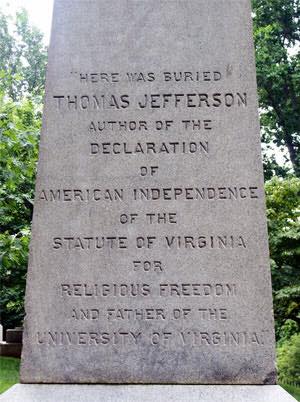
04 Jul REMEMBERING THE FATHER OF INDEPENDENCE
Thomas Jefferson, April 13, 1743 – July 4, 1826
The summer I turned twenty-one years old, I was living in a dorm room at Trinity University in Washington D.C. I went to D.C. to work as a Congressional Intern. It was one of the single greatest adventures in my life to this point. I did not know anyone there, I was all alone, and had to make new acquaintances and foster new relationships in a town where everyone already seemed to know each other. I was frightened and mesmerized at the same time.
I grew up in SW Missouri. I had never been on a subway, or as it is Called in D.C., a metro train before. I had never walked down a sidewalk and seen that many people all walking the same direction at the same time. Everything was so busy, so exciting, and in my enthusiasm I would find myself so enthralled with joining in the hustle and bustle of the masses, that it resulted in getting off at several wrong stops, passing by several necessary turns, and being generally late to everything that first week or so.
I noticed something else too. At night the endless migration of humanity, to and from and back again, would cease suddenly. The City would take on this unnerving quiet. I’ve always described it as that uneasy calm before you see a wall cloud form in a dead Oklahoma sky. I couldn’t take the quiet, and all I had waiting for me at my little dorm room was some Bologna cooling itself in my classic blue and white Igloo ice chest. I didn’t have any friends to got out with that first week or two either. The city would just feel alone, and the last thing I wanted to do was compound that feeling of quiet with my own loneliness. So I went to the monuments.
If you have never visited the monuments in D.C. at night, you should. For a couple of reasons. First, they are beautiful, the marble and stone that were used to honor these great men, takes on a different feel after the sun runs out over the horizon. Second, they speak. The easy thing to do would be to think I’m crazy. Don’t do the easy thing, go and see for yourself, and find out if I really am.
Well everyone has their favorite. I was in awe of the obelisk that honored Washington, I enjoyed sitting on the top step right in front of Mr. Lincoln and tried to imagine what he was thinking as he looked across the reflecting pool, but my favorite was Jefferson. As far as grandiose goes, it is probably the least of the three, but it feels right, it feels like he designed it himself, just the way he would have wanted it. This makes sense, given that the dome that crowns the memorial appears to have been lifted off of his Monticello home.
I want to write a little about Thomas Jefferson in honor of this Independence Day, but I want to keep everything in perspective, I think that’s how he would want it. For example, I’m not going to say that “There would be no United States of America, without Thomas Jefferson”, I don’t believe that is necessarily true. However, I do believe that if not for Thomas Jefferson, we might be on our third or fourth United States of America at this point. He was pretty important.
So what do think Thomas Jefferson is most proud of? What did he think were his greatest accomplishments? Well our third President of The United States, actually told us. He is well known for designing his home, Monticello, among other things, as well as his own tombstone, and he listed them right on it. This might be hard to understand, especially during the current political climate of an election year, but President was NOT one of them. When you take a closer looks at the listed accomplishments and the man himself, I think it’s easy to understand why being President didn’t make the list.
1. Author of The Declaration of Independence.
On July 4th, 1776 fifty-six men signed a document written by Thomas Jefferson, that would serve as indisputable evidence of their treason, and could result in their execution. Most Americans are familiar with the second sentence of the document, “We hold these truths to be self-evident that all men are created equal, endowed by their Creator with certain unalienable Rights, that among these are Life, Liberty and the pursuit of Happiness.” This is know as one of the greatest sentences ever written in the English language, and I can not be counted as one to disagree.
It is important to remember that The Declaration of Independence was not written for the purposes of publication and pamphleting, like so many other similarly themed documents before it. It was written for an audience of one, actually, the King of England. The Declaration of Independence first and foremost is an indictment. It list the crimes of the crown, and declares the independence of of the American colonies as the appropriate penalty.
I have no idea how many indictments I have read over my career, but I’m guessing it’s a lot. I have never been, nor can I imagine being a prosecutor. A prosecutor prepares an indictment on behalf of the people and serves it upon the individual or individuals that have violated the law that protects the people. Thomas Jefferson drafted the greatest indictment ever written, and claimed that the King of England should be penalized, not only for breaking the laws of man, but for breaking the laws of God as well. To put this in context you must also remember that the King believed that his status was one that was chosen by God. These are all reasons why the fifty-six men that signed this document were going to die if they were ever caught, and Jefferson would have probably been the one to die the longest.
We have had some pretty courageous Presidents that have made some pretty courageous decisions from the seat of the Presidency, but it’s a difficult argument to make that any top what Jefferson did when he drafted this document. Also, from a literary perspective it’s right up there as well. If the Constitution represents the foundation upon which our country is built, then The Declaration of Independence is the cornerstone. The Constitution is subject to change via the amendment process, the words which Jefferson penned in creating his finest achievement have and never will be changed or amended in any way. The Constitution represents what America is, whereas the Declaration represents what America wants to be, and that is exactly how Jefferson wrote it.
2. Author of the Statue of Virginia for Religious Freedom.
I’m not writing a book here so I’m not going to help you brush up on all of your American History, but if you’re not aware there were a lot of things that happened after The Declaration of Independence and the actual ratification of the United States Constitution. Among those things was a war, actually a couple of wars, some conventions, arguments over state sovereignty, and all kinds of other things. You have to remember that nearly a quarter of a decade would pass between the time in which The Declaration of Independence was signed and Thomas Jefferson began his first term as our third President.
In the meantime, the individual states were experimenting with democracy, something that would later become a theme for how our country was to operate. One of those states was Virginia, and Virginia was where Jefferson was a member of the state assembly. Although he drafted the statute in 1777 it wasn’t introduced until 1779, and it wouldn’t be until 1786 that it was actually enacted into law. It is an example of genius. After reading this article, the first thing you should do is Google the Virginia Statute and read the entire thing for yourself. It would become the basis for the Establishment and Free Exercise Clause of the First Amendment, however it represents so much more. It is again a declaration, but this time not a declaration of Independence from a illegal government, but rather a declaration of personal freedom from ANY government. In my most humble opinion it represents what the American notion of Liberty is supposed to mean.
My favorite is the last line; to me it says “God wants us to have freedom to worship how we want, where we want, and who we want, if we want. And, if government tries to change that for any reason, then it is against God.” Here’s the text:
“yet we are free to declare, and do declare that the rights hereby asserted, are of the natural rights of mankind, and that if any act shall be hereafter passed to repeal the present or to narrow its operation, such an act will be an infringement of natural right.”
Again, you have to read the entire statute, it is an amazing prologue to what will eventually shape the Bill of Rights. So far Jefferson has committed high treason and gotten all of the leaders of the American Colonies to go along with him and survived, and he has written the inspirational text for what will become the Bill of Rights. It should be no surprise that President hasn’t made his list yet.
3. Father of the University of Virginia.
Maybe this is where we start scratching our heads. UVA? I’m kinda laughing to myself right now because I know at least 40% of those reading this are trying to think of just one quarterback, or anybody really that came out of UVA. If it helps, both Tiki and Ronde Barber went to UVA.
To understand this you have to understand a little about Thomas Jefferson. Although Ben Franklin is often considered America’s renaissance man, he had very healthy competition in Thomas Jefferson. Jefferson was a notable surveyor, farmer, mathematician, architect philosopher, lawyer, and writer among many other things he was also great at. He was a great reader of all books. When the Library of Congress burned, Jefferson donated his personal collection so it could continue to exist. A list of his accomplishments, inventions, and contributions to most of the sciences would be lengthy to say the least. He was a scholar and from that aspect it might be easy to say, “well that’s why he thinks that creating a University was such a big deal. He was one of those smarty pants, book nerds who would think that’s a big deal”. However, there is more.
Jefferson gives us a clue in both of his first two greatest accomplishments as to why this one is so important. I believe it all comes back to his belief in the individual over the government. Jefferson was a prolific writer. He wrote to everybody. And in all of his writings you keep seeing the same theme, that the government is secondary to the individual. This is not to say that the individual is always right, or that the government is always wrong. Jefferson believed that through education came progress, and that the human race and its goodness was always evolving for the better, not the worse.
Jefferson for all of his good ideas was not perfect. He wrote a good deal about Liberty and Individual Freedom, but he owned people. He was a slave owner. What is so interesting about Jefferson is that for all of his accomplishments and his genius, his writings do not necessarily reflect his desire to prove he is the one with all of the answers. Rather, he seems to suggest that humanity, when allowed to be free, will come up with the answers.
Let me use an example to make my argument. In 1789 Jefferson wrote a letter to Thomas Paine. He was discussing the French Revolution and the proposals for a New France free of a ruling monarch. Here is what he said regarding France’s decision not to adopt a trial by jury system:
“I consider trial by jury as the only anchor ever yet imagined by man, by which a government can be held to the principles of its constitution.”
Earlier I mentioned that Jefferson was a lawyer and a legislator, and that he drafted the greatest indictment ever written. So here is a lawyer and legislator telling Thomas Paine that non-lawyers and non-legislators are the best choice in deciding what the fundamentals of governing law should be. Thomas Jefferson could have easily been an egomaniac that cornered the market on being Thomas Jefferson. He could have designed a tombstone that listed all the great things he was and how nobody else could be as great as him. Instead he believed that one of his greatest accomplishments was founding a University where we could develop more Thomas Jeffersons and possibly better Thomas Jeffersons. That is how you father a nation instead of just running one.
It is only appropriate that Thomas Jefferson died on the anniversary of one of his greatest accomplishments, July 4th, 1826.
So you’re probably wondering what he said to me on those nights that I visited his memorial. One of those crazy voices in your head kind of things. Well, just like Washington and Lincoln, he didn’t say a word. I said “they speak”, I didn’t say I heard voices. They speak in the same way that anything speaks when it is a reminder of greatness, but also place of inspiration as well. They speak of courage, sadness, triumph, war, life, and death. They speak to whatever you need in that moment, and for me, I just needed to know where I came from so that I could understand where I was going.
Happy Independence Day!




No Comments